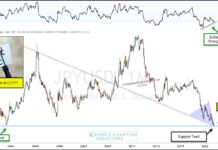 By Greg Naylor March was an eventful month, as the Euro zone dealt with another crisis, this time in Cyprus, and the sequestration went into effect in the U.S. The U.S. stock market continued to see strong inflows. Here is a re-cap of March by the numbers:
By Greg Naylor March was an eventful month, as the Euro zone dealt with another crisis, this time in Cyprus, and the sequestration went into effect in the U.S. The U.S. stock market continued to see strong inflows. Here is a re-cap of March by the numbers:
Stocks & Bonds
The U.S. stock market continued its strong start to the year, although some international stocks posted losses. Bonds also posted small gains, as inflation remains below Bernanke’s target.
| S&P 500 Total Return | MSCI EAFE | BarclaysAggregateBond | Unadjusted CPI | |
| March | 3.75% | 0.41% | 0.08% | 0.82% |
| February | 1.36% | -1.16% | 0.50% | 0.29% |
| YTD 2013 | 10.60% | 4.39% | -0.13% | 0.84% |
Commodities & Currencies
NYMEX crude rose 5.6% in March. Most other commodities posted either small gains or declines for the month, as a strengthening dollar offset hopes for better economic growth.
The dollar index rose again in March, by 1.27%. The yen continued to decline to new lows as historic monetary stimulus goes into effect. The central bank in Japan is planning to purchase up to 70% of all Japanese government debt.
Economy
Economic indicators offered mildly good news in March. The Institute for Supply Management reported that the manufacturing PMI in March fell to 51.3, still expansionary but less so than in the preceding months. Consumer confidence also remained confoundingly optimistic, with the University of Michigan’s survey gaining 1.0% to 78.6.
The National Association of Realtors (NAR) reported that the annual rate of existing-home sales in February increased by 10.2% from February 2012. National median prices rose from the prior year by 11.6% to $173,600. Foreclosures and short-sales, as a percentage of overall sales, ticked up slightly from 23% in January to 25% in February.
Summary
The Bank of Japan, prodded by the new Prime Minister, is essentially planning to monetize the Japanese government’s debts in an all-out effort to defeat deflation. The U.S. and others are worried that this is a blatant attempt to devalue the yen to gain a competitive advantage. Exporters in the U.S., Europe and China could be affected if Japanese exports are suddenly less expensive in global markets. Currency wars would certainly disrupt the flow of international trade.
In the U.S., the effects of the sequestration have not yet been felt. Although the stock market is showing signs of optimism, this should also be tempered by the headwinds we face going forward. U.S. exports might still be hurt by a strengthening dollar relative to the yen and euro, at the same time as domestic demand weakens due to the sequestration. Although stocks remain historically cheap according to P/E ratios, the stock market is notoriously unpredictable.
This material was prepared by Greg Naylor, and does not necessarily represent the views of Woodbury Financial or its affiliates. This information should not be construed as investment, tax or legal advice and may not be relied upon for the purpose of avoiding any Federal tax liability. This is not a solicitation or recommendation to purchase or sell any investment or insurance product or service, and should not be relied upon as such. The S&P500, MSCI EAFE and Barclays Aggregate Bond Index are indexes. It is not possible to invest directly in an index.
Investing involves risks and investors may incur a profit or a loss. Past performance is not an indication of future results.
Data Sources:
- www.standardandpoors.com – S&P 500 information
- www.msci.com – MSCI EAFE information
- www.barcap.com – Barclays Aggregate Bond information
- www.cmegroup.com – NYMEX crude prices
- www.bloomberg.com – U.S. Dollar & commodities performance
- www.realtor.org – Housing market data
- www.bea.gov – GDP numbers
- www.bls.gov – CPI and unemployment numbers
- www.commerce.gov – Consumer spending data
- www.napm.org – PMI numbers
- www.coinnews.net – Gold and silver price information
About Greg Naylor: Greg is a partner and co-founder of Fiat Wealth Management, an independent financial advisory firm in Long Lake, Minnesota. He has been investing for over 7 years and enjoys sports, reading, singing, and spending time with family. Greg is a 2004 graduate of the University of Minnesota and lives in South Minneapolis with his wife Kat. Click here for more articles by Greg.
Twitter: @seeitmarket Facebook: See It Market








